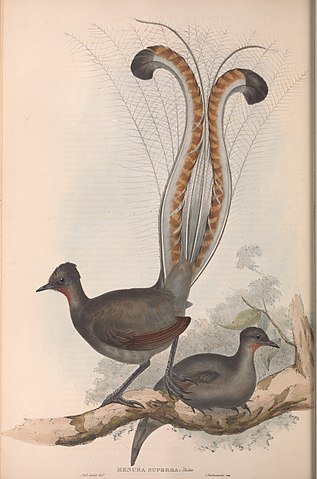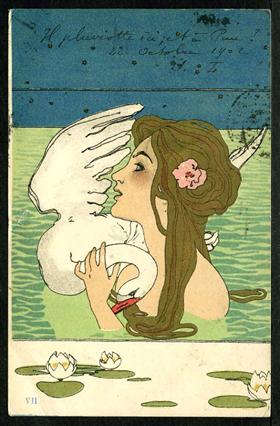Back home from Troy with Helen, Menelaus reflects. The vision of the reunion at the fall of Troy is by the fifth century BCE Brygos painter. Read the poem by J de S Westbrook here.

In the “Poscimur” ode, Horace addresses his lyre and claims that, together, they have made a new type of Roman poetry by transmuting Greek originals. The lyre is probably not a real one, any more than this lyre bird is: it stands for Horace’s poetic skill and genius. Hear the poem and follow in English translation here.

The great German poet Friedrich von Schiller wrote a thrilling free version of the Books of Virgil’s Aeneid which deal with the fall of Troy and the Story of Dido and Aeneas. This extract from the second – Book 4 – is Dido’s reproof to Aeneas when she discovers he has been planning to leave her. Listen to the German read by Tatjana Pisarski and follow an English translation here.
The illustration shows another famously and justly angry mythical woman – Medea – painted by Evelyn de Morgan.

Palinurus the great navigator and helmsman is betrayed and thrown overboard by the God of Sleep. The Gods have decreed that his life is the price of his companions’ safe onward journey: he will become the archetype, down the ages, of the poor mariner lost at sea. Hear the extract here.
Illustration: Wikipedia Loves Art participant “Opal_Art_Seekers_4“, WLA taft Plate with Palinurus Overboard, CC BY 2.0

Jupiter has saved Aeneas’s fleet from burning and his father Anchises appears with an invitation to visit him in the Elysian fields. The illustration, by William Blake Richmond, shows Anchises in his younger days when he first met Aeneas’s mother, the Goddess Venus. Hear the poem here.

Aeneas’s enemy Juno has duped his tired and travel-worn Trojan women into setting fire to his ships while he holds rich funeral games in Sicily for the anniversary of the death of his father Anchises. Juno and the women hope that he will give up his destiny in Italy and settle where he is. In today’s extract here, Aeneas calls on Jupiter to save the ships in the nick of time. Help is granted: only the old, tired and timid will stay and Aeneas will go on to Italy with a smaller but more select band composed solely of the young, brave and battle-ready. In the illustration, Claude Lorrain (1600 – 1682) uses the incident as an excuse for a charmingly mysterious seascape.

Callimachus, the great Greek elegist, remembers his friend Heraclitus, a poet over the seas, and his nightingales (his poetry): hear the Greek and follow in English here. On one of his very best days the Victorian, William Johnson Cory, wrote the verse translation below.
They told me, Heraclitus, they told me you were dead;
They brought me bitter news to hear and bitter tears to shed;
I wept as I remembered how often you and I
Had tired the sun with talking, and sent him down the sky.
And now that thou art lying, my dear old Carian guest,
A handful of grey ashes, long, long ago at rest,
Still are thy pleasant voices, thy nightingales, awake;
For Death, he taketh all away, but them he cannot take.


